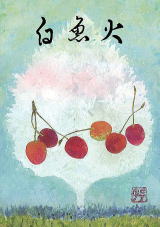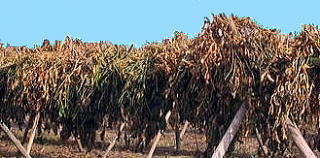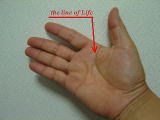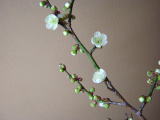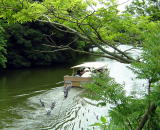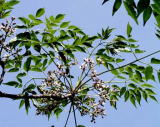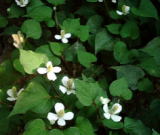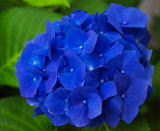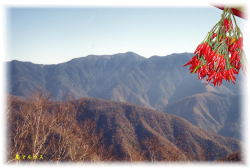| 最終更新日(update) '11.05.02 |
| 2008 |
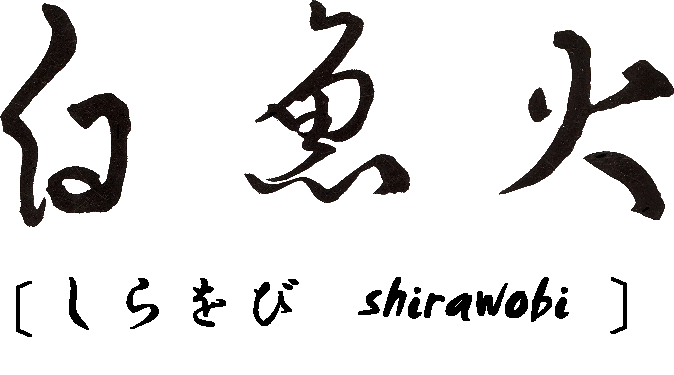 |
|
|
| ここに掲載の句は白魚火誌の“白魚火秀句”に掲載されたものの英訳です。 翻訳はホームページ担当者が行っていますので、作者の意に染まないところや名前の読み違いには直ぐに対応します。メール |
| Shirawobi is the name of a Haiku magazine and an association of Haiku enthusiasts that has existed for fifty years in Shimane Prefecture, Japan. The following Haikus are written by the members of the Shirawobi group, selected by its chairperson Mr. Masafumi Nio, and rendered into English by its web-site editor. The words in the single brackets are Haikus in Japanese and those in double brackets are the authors' names. |
|
|
|
|
| Haikus Selected from '08 January edition of the Shirawobi |
||
| to '08 January Japanese page | ||
|
|
||
| (Ganjou-naru bucket wo kai nu fuyu-donari) ((Moriyama Nobuko)) I bought a durable bucket... winter is coming (Mame-haza no yama no hi hanare hajime keri) ((Murakami Shouko)) the autumn sunbeam on the soybean-hazas has been going by
(Aki-gusa wo kazaru kuruma ni ne-tomari shi) ((Sawayanagi Masaru)) we travel by the R.V. that cabin is now decorated with autumn wild flowers (Futo-pen no shi yori no tegami ichii no mi) ((Katagai Yoshie)) the bold writings written with pen by haiku master ... berries of yew (Akushu shi te mugon no egao yagaku no ko) ((Tezeni Miyako)) a night student silently shake hands with me and smile (Hara no bou suu to nuka re shi kakashi kana) ((Mineno Keiko)) the scare-crow's spine bar was mercilessly pulled out, after rice harvest (Taga no take notauchi te oru yagyou kana) ((Ueno Yonemi)) bamboo-made-hoops look like writhing at my night's workshop (Nokke kara hole-in-one ten takashi) ((Uchida Keiko)) from the very start, hole-in-one happened... autumn sky is clear and blue (Koshi-kago wo tsuke te souryo no kinoko-gari) ((Soga Tsuyako)) Buddhist priest gathers wild mushroom with bamboo-waist-basket (Taiiku no hi nari sei dashi aruki keri) ((Segawa Toki)) I did walking long... Health-Sports Day |
||
|
|
| Haikus Selected from '08 February edition of the Shirawobi |
| to '08 February Japanese page |
|
|
| (Dai-nenjyu yukkuri mawasu aoki no mi) ((Kinpara Keiko)) huge praying-beads of string are slowly handed over... berries of Japanese laurel (Stove ni sun wo awase te maki wo kiru) ((Watanabe Harumine)) I cut firewoods to adapt for our stove (Kumo ni ashi kake jyoudo-ji no matsu teire) ((Yamazaki Takerou)) gardener trims pine in a temple as if he put a foot on a cloud (Teno hira ni nose te mattaki ko-no-mi kana) ((Tsuji Sumiyo)) putting on my hand, I appreciate a flawless acon (Kan-nushi no tongari te ori tabi no sakio) ((Nakanishi Akiko)) Shinto priest wore a pair of pointed tabi (Suki-kasanuru kami no soko yori shitataruru) ((Shibayama Yousaku)) Japanese papers are just made and piled up, water drips from the bottom (Kaerimi te tan jitsu no goto kijyu mukau) ((Watanabe Miyoko)) I turn seventy-seven, I feel that the past was only a day (Hachimono wo dashi tewa modosu shimo-yohou) ((Fujita Taeko)) I put potted plants out and in, from house, by frost warning (Koujyou no heisa tsutsuji no kurui-zaki) ((Hattori Yuushi)) a factory is closed down... azaleas bloom out of the season |
|
|
| Haikus Selected from '08 March edition of the Shirawobi |
| to '08 March Japanese page |
|
|
| (Yokoza ni ha matagi no suwaru kuma no kawa) ((Kurita Yukio)) the top seat for Matagi* by the hearth has bearskin cushion *Matagi is the group or person whose profession is hunting 、living in the snowy mountain area in northwest part of Japan mainland. (Kako-chou ni tsuma no kuwawari kozo-kotoshi) ((Ooishi Hirojyo)) my husband is now in family register of deaths... New Year's Eve (Kan-nebutsu magaru toki sora chira to mi shi) ((Inai Bakushuu)) a priest in the Kan-nebutsu* party glanced the sky at a street corner (Chichi mo ko mo fue no za tsugi nu sato-kagura) ((Hayakawa Toshihisa)) father and his son are now flute player for sato-kagura* *Sato-kagura is the sacred music and dance to dedicate to their local Shinto shrine, performed by the local people. (Kan-ai ya hori-be no sabou hi wo otosu) ((Teramoto Yoshinori)) winter mist on the moat-- a tea-room's lights are turned off (No-zukasa wo toku kakeyuke ri kari no inu) ((Morii Akie)) a hound ran through the hillock (Fuyu-ki no me miagu onore wo kobu sen to) ((Bandou Noriko)) I look up leaf buds of tree to inspire myself (Toshi-wasure tooi hito kara atsumare ri) ((Oosaku Yoshinori)) year-end party-- the farther attendants live the earlier they arrived (Oya no i te ko no soroi taru o-ganjitsu) ((Hirokawa Keiko)) old parents and their children all gathered... New Year's Day |
|
|
| Haikus Selected from '08 April edition of the Shirawobi |
| to '08 April Japanese page |
|
|
| (Yuki no yo no atsude no coffee-cup kana) ((Okugi Naoko)) snowy night... I drink coffee with thick cup (Kogarashi-ichi-gou Souya misaki wo shihatu se rie) ((Toujyou Mitsuo)) the first wintery blast has started at Soya Point toward the south (Me ga warau mask chika-yori kitari keri) ((Hayasaka Aijyo)) a person worn flu mask stepped up to me with friendly eyes (Yudate no gi maiku no hirou mogari-bue) ((Fukushima Fusako)) at the Yudate ritual, microphone catches the sound of mogari-bue*. * Mogari-bue is the sound that winter gale makes when it goes through dead bamboo or wooden hedge. (Umi made no kyuuna sakamichi kan-geiko) ((Hieda Shuumi)) steep road to the sea... boys practice martial arts in the chilly air (Inochi-zuna tsuke te shime haru Nachi no taki) ((Abe Fumiko)) using climbing rope, Shinto straw festoon is put over the Nachi Falls (Kasen-shiki mebuku yanagi no isshoku ni) ((Kuya Kiyo)) the whole dry-riverbed has been covered by budding willow (Hakubai ni kosan no kaku no onozu kara) ((Hamazaki Hiroko)) there is something dignified about white flowers of the oldest plum-tree (Daikan no Tone no kawahaba matage sou ) ((Sakamoto Kiyomi)) it seems as if the Tone River can be stridden across in the dry winter (Fuyu no hi wo hiza ni nose tsutsu hari-shigoto) ((Miyahara Shiyou)) winter sun warms my laps, and I do needlework |
|
|
| Haikus Selected from '08 May edition of the Shirawobi |
||||
| to '08 May Japanese page | ||||
|
|
||||
| (Itemichi wo yuku kesshin mo tochuu made) ((Yoshimura Michiko)) halfway of frozen path, my decision to walk was weakened (Koodori wo shi tsutsu nagaruru haru no mizu) ((Motosugi Ikuyo)) spring brook flows as if it jumps for joy (Seimeisen kubome te kazou toshi no mame) ((Noda Sotojyo)) I count the Setsubun sou-beans, by putting them on the line of Life*
(Ishibashi wo dobashi wo watari ume saguru) ((Inai Bakushuu)) passing over stone and wooden bridges, I go to see ume* blossoms
(Tobiishi wo ku no ji kubari ni ume shiroshi) ((Funaki Toshiko)) stepping stones are in staggered arrangement... white ume blooms (Ume saku ya jyurei wa yuu ni hyaku yo nen) ((Fukuda Isamu)) ume blooms... the tree looks like over a hundred years old (Setsugen ni senketsu taka no tachi shi ato) ((Igarashi Toujyuu)) after a hawk flew away, there was fresh blood in snow field (Hadaka-gi no seihin ni shite yasurage ru) ((Furukawa Shimiko)) withered trees in winter look as if they enjoy honorable poverty (Kuhi issai katawara ni ada fuyu-botan) ((Sone Suzue)) peony flowers-- a pretty women is by one-year-old haiku slab (Tomogara wa kyuu-shougatsu no kuni yori ku) ((Naknao Hiroko)) friend comes from the country where is on the lunar New Year |
||||
|
|
| Haikus Selected from '08 June edition of the Shirawobi |
| to '08 June Japanese page |
|
|
| (Nouzei-ki himashi ni hosoru take no yuki) ((Satou Isao)) tax payment term*-- the snow shape on the hills is getting smaller * "Tax payment term" in Japan is from February 16 to March 15. (Necktie no musubi-me kataki hana-zukare) ((Taniyama Mizue)) tie's knot is tight... I was tired from hana-mi* * "Hana-mi" is to go to see cherry blossom and a kind of picnic. "Hana" means cherry blossom and "mi" means viewing. (Hatauchi no keitai radio yori haiku) ((Sugiura Huzuki)) hoeing in the field, I listened to the radio program of haiku (Hana-mushiro hanabira ochi shi ue ni shiku) ((Yamaguchi Akio)) we spread a hana-mushiro* over the petals of cherry blossom*. * "Hana-mushiro" is a straw mat that they spread under cherry tree to view its beautiful blossoms. (Tonekko* to hashiru shounen maki hiroshi) ((Akagi Setsuko)) a boy runs with a tonekko* in a vast pasture * "Tonekko" means one-year-old-horse, and is the Hokkaido dialect. (Tsuchihuru* ya shiranui-gata no dohyo-iri) ((Gotou Masaharu)) tsuchifuru*-- a sumo wrestler performs Shiranui-style dohyo-iri * "Tsuchihuru" or "kosa"is the atmosphere that contains yellow sands from Gobi Desert, in spring. * There are two kinds of style for dohyo-iri:sumo-ring-entering ceremony, performed by sumo champion: yokozuna,which are Unryu-style and Shiranui-style. Now all two sumo chanpions are from Mongolia in early 2008. (Shimokuren chiri te murasaki ushinae ri) ((Nakamura Kuniji)) purple magnolia's blooms scattered, no purple left on the tree (Yuki nokoru sanbyaku-mai no tanada kana) ((Ishikawa Toshiki)) there are three hundred tanadas with remaining snow *"Tanada" is a terraced rice field in mountain area. |
|
|
| Haikus Selected from '08 July edition of the Shirawobi |
| to '08 July Japanese page |
|
|
| (Manmaku ni uma no keage shi haru no doro) ((Takaoka Ryouko)) vernal mud is on the manmaku, running horses made *Manmaku is the curtain for typical Japanese ceremony ,with which surrounds the place . In this case, writer is watching the yabusame in spring. (Hatsu-ne niwa hatsune no mane de kotae keri) ((Okuno Tsuyako)) I heard the hatsu-ne and replied to it with its mimicry *Hatsu-ne is the song of Japanese bush warbler in early spring .It is not fine then. (Noboru hi ni kumo kakari iru showa no hi) ((Iizuka Hiroko)) the rising sun is clouded... Showa Memorial Day *Showa Memorial Day is a national holiday when Emperor Hirohito was born, April 29. (Seki wo kosu mizu wa ichi mai asa-zakura) ((Murakami Shouko)) the falling water at weir looks like one plate... morning cherry blossoms (Miokure ba ko wa kagerou ni nari ni keri) ((Furuta Kinue)) looking after my son, heat haze burred him (Haru-yasumi dengon-ban ni naguri-gaki) ((Yanagawa Shigeko)) the spring vacation-- I saw a scrabble on message board (Yamafuji wo kasumuru hodo no kyuu-curve) ((Hieda Shuumi)) my car almost toutches wild wisteria on winding road (Kuro-ageha hana ni todomari tewa tomari) ((Ooishi Koyo)) a black swallow-tail hovers then alights on flowers (Haru no yume tsuma towa chigau hito to ite) ((Okada Kyouko)) in my spring dream, I was with the man, not my husband |
|
|
| Haikus Selected from '08 August edition of the Shirawobi |
| to '08 August Japanese page |
|
|
| (Soba-uchi no menbou no tsuya yamase fuku) ((Oomura Yasuko)) the gloss of rolling pin for buckwheat noodles --yamase* blows * "yamase" is a cool, onshore, easterly wind in the Sanriku district of Japan in summer. That often brings bad rice harvest. (Natsu-tsubame kyou kaiten no ad. baloon) ((Ogawa Keiko)) summer swallows-- advertising balloons are over the opening mall (Ni-soku me no zouri ni kae shi ara-mikoshi) ((Kurebayashi Kouichi)) the lads changed into second straw sandals-- violent mikoshi (Hyousatsu ni oshie-go no na ya mugi no aki) ((Ikuma Akiko)) I found a door plate of my pupil-- wheat harvest time (Nan-to-naku ijitte mi tashi ari-jigoku) ((Ookubo Kifuu)) somehow, I want to finger a doodlebug's pit (Ketsuatu-kei koo te ki shi yo no tokoroten) ((Fukuya Kouji)) the night I got a new manometer... gelidium jelly (Shungyou ya yama mada iro wo nasa zari shi) ((Daisaku Yoshinori)) a dawn in spring-- mountains are still monochromatic (Tanidani wo fukaku shizume te yamaboushi) ((Takazoe Fukuyo)) many yamaboushi * deeply cover canyons *"Yamaboushi" is a kind of dogwood. |
|
|
| Haikus Selected from '08 September edition of the Shirawobi |
||||
| to '08 September Japanese page | ||||
|
|
||||
| (Oo-yuyake damatte tatte iru otoko) ((Toujyou Mitsuo)) flaming sunset-- a man is standing silently (Hori-bune no suberu goto sugu hana-ouchi) ((Okuno Tsuyako)) moat's boat pasts as if to slide... flowers of chinaberry
(Juuyaku wo ike te Hearn no fujin no ma) ((Hazama Toshiko)) -at the Hearn musium- Juuyaku* is arranged, in the room Mrs. Hearn* used *Hearn: Patrick Lafcadio Hearn:Koizumi Yakumo,is a novelist who lived in Japan with his Japanese wife Setsu, and wrote many novels in English based on Japanese folktales. * A weed and medical plant:Jyuuyaku, is called Dokudami generally in Japan .
(Tsuyu fukashi gyoukei nisshi toji shi mama) ((Takashima Fumie)) -at the Hearn musium- the very rainy season, "Royalty visited here"report has been shut (Hito shizuku mata hito shizuku shitatare ri) ((Maeda Kiyokata)) a drip of water, and then another drips (Hotaru-mi no youjinbou ni tsuma sasou) ((Ootsuka Sumie)) I ask my husband to escort... for firefly's viewing (Shibaraku wa kinu no ame furu ko-ajisai) ((Shimizu Yoshiko)) silky rains fell for a while... deep blue hydrangea
(Beer nomu dare mo kuchibiru togara se te) ((Sakta Yoshiyasu)) everyone drinks beer, pouting out their lips |
||||
|
|
| Haikus Selected from '08 October edition of the Shirawobi |
| to '08 October Japanese page |
|
|
| (Kacchuu no ugoki-dashi taru atsusa kana) ((Taniyama Mizue)) -at the Matsue castle- a hot day-- the displayed armors seem to start walking (Tamanegi wo tsuru kan-nabi no yama ni muke) ((Gotou Yoshiko)) onions are hanged on a rod, facing against the God's mountain (Hoshiai no umi ni uki taru yome-ga-shima) ((Oka Asano)) the Yome-ga-shima* is in the dark lake... the Star Festival *Yome-ga-shima is a tiny island in the Lake Shinji and has a tragic folktale about a young wife. (Funa-mushi no nigekomi shi mizu name te miru) ((Wakiyama Sekishou)) I taste the lake's water sea louses have gone (Hankachi no kaori honokana kyou-kotoba) ((Hara Kikue)) a subtle scent of handkerchief-- Kyoto dialect (Hashii shi te sugi shi hi no koto saki no koto) ((Morii Kyouu) the cool evening breeze-- I think of my life in the past and the future (Unkai no naka yuku bus ni nori-awasu) ((Kawai Hiroko)) I get on the bus that went through a sea of clouds (Odoru wa no kuraki tokoro de iki wo nuku) ((Nakanishi Akiko)) Bon Festival dancing circle-- I take a break, while in the dark * Bon Festival dancing is held at the community's square at the night of the Bon Festival days in July or August. The dance musics are traditional folk songs, and they form a large dancing circle that turns around the square. (Doyou niwa hoshi to hanase ri sen no ume) ((Senda Minayo)) summer airing-- pickled umes talked with stars at night *pickled ume:Japanese apricot, is dried up once in the air, in the middle of summer. |
|
|
| Haikus Selected from '08 November edition of the Shirawobi |
| to '08 November Japanese page |
|
|
| (Shuukou ya mio hiki oki wa toozakaru) ((Takemoto Chuusai)) the sunbeam of autumn-- Oki-shoto goes away behind the wake (Osarai no fue ya taiko ya matsuri kuru) ((Atsumi Shousaku)) the rehearsal of Japanese flutes and drum... our festival comes (Kado-kawa no kyou aki tachi shi mizu no oto) ((Hazama Toshiko)) I felt the sign of fall through the sound of brook at our gate (Kesa no aki zaitaku care no mame no kayu) ((Morii Akie)) sign of fall-- I care for old parent in house and feed azuki bean gruel (Hachi-gatsu no suna no omotaki suna-dokei) ((Oosaku Yoshinori)) sands of hour-glass looks dull in August (Uchiwa dake migi-te de tsukau hidari-kiki) ((Kubo Mitsujyo)) I fan myself with right hand, lefty though (Abuku hitotsu tameiki kingyo ni mo aru ka) ((Kawashima Akiko)) one bubble... does goldfish sigh? (Hikouki-gumo sekiranun ni totsunyuu su) ((Kurino Kyouko)) a vapor trail plunges into a thundercloud (Haha no ani ima mo shounen shuusen-bi) ((Uchida Keiko)) my maternal uncle in uniform is still a lad... Shuusen-bi* * Shuusen-bi is the anniversary of the end of the Pacific War: August, 15 . (Fuurin no aki no neiro to nari ni keri) ((Shibata Masae)) a wind-bell has given out autumnal sound |
|
|
| Haikus Selected from '08 December edition of the Shirawobi |
|
| to '08 December Japanese page | |
|
|
|
| (Yukemuri ni tappuri fure te aki oshimu) ((Takeuchi Yoshiko)) I was dipping wet through the yukemuri*... autumn is leaving *Yukemuri means the clouds of hot-spring's steam. (Sanmyaku wo miharasu noki no tougarashi) ((Ooshiro Nobuaki)) hanging red peppers, the eaves look onto steep mountain range
(Kaze-guse no tsuki shi Shirane no nanakamado) ((Shinohara Yonejyo)) wind-biased rowans have turned red in Mt. Shirane (Mokusaku no hagi kare-some shi no-buro kana) ((Tanaka Aiko)) hagi* by wooden fence begins shedding leaves... open-air bath *Hagi is Japanese bush clover (Kohyou naredo aki no ka no jab kurai keri) ((Shibayama Yousaku)) it was short of stature, but the mosquito had jabbed me (Aki-tomoshi fuete de hirou oji no hone) ((Komatsu Michijyo) an autumn lamp-- we gather my uncle's ashes with recessive arms * In Japan, the cremated ashes are gathered up and put into an urn by the family, relatives and friends. At that time, they use their recessive arms with big chopsticks instead of their dominant arms, so that the sorrowful incidentr must be unusual. (Mikazuki ya nami wa hamabe wo togi ni keri) ((Taguchi Kou)) a crescent-- waves have sharpened the shore |
|
|
|
